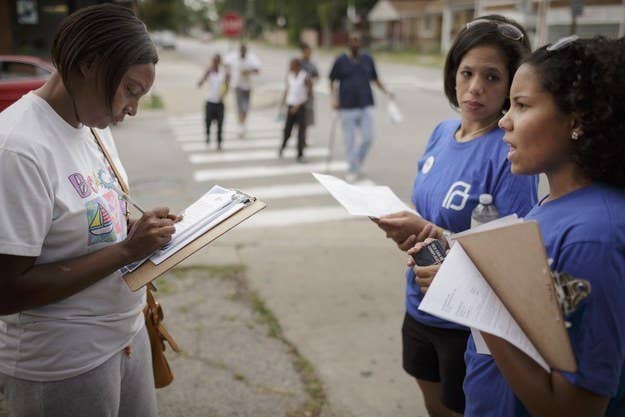
[Update: This study was retracted in May 2015 after the lead author of the study said his co-author had faked the results. BuzzFeed News reports here.]
A report published Thursday in Science finds a person who identifies as gay and advocates for same-sex marriage in person can significantly change voter opinions. The findings, released by researchers at the UCLA and Columbia University, are based on an experiment conducted in Los Angeles over the past 18 months involving canvassers visiting voters at home.
When canvassers revealed they were gay while making a case for same-sex marriage laws, voters progressed on the issue at five times the rate of the general population. Not only that, voters retained that new viewpoint the next year, reporting a 15-point shift toward supporting same-sex marriage. The effect spilled over to other members of the household.
"We thought for a long time people were resistant to change," Michael LaCour, who designed the study and co-authored the report, told BuzzFeed News. A meta-analysis of 900 previous studies found that persuasive arguments only lasted a couple weeks, he said. As a result, political instruments designed to manipulate public opinion, like television ads or glossy mailers, are considered temporal tools at best. But with this technique, "It is possible to change people's minds with a single conversation about something we consider divisive," LaCour said. "This is the first evidence of this."
The implications of the study co-authored by Donald P. Green could be far-reaching, not just for LGBT rights but influencing opinions on a range of divisive cultural debates, from abortion and gun laws to immigration.
The lesson for other movements, said LaCour: "The people who create change are the ones who have a direct personal stake, which is contrary to the psychological literature that says people removed from the issue" — such as straight celebrities advocating for LGBT rights or natural-born U.S. citizens calling for immigration reform — "have the ability to create the most change." That sort of conventional wisdom, he said, has long held that third parties were the best messengers, not those directly affected in a controversial situation.
For the UCLA doctoral student, this study is the culmination of years of study on shifting opinion, including changing views on abortion, and may serve as a potential launching pad to a prominent academic career. "Hopefully in a few weeks I'll have a professorship title," he said by phone at the beginning of the interview with BuzzFeed News. "I did nine job talks in the last three weeks."
Starting more than 18 months ago, LaCour asked roughly 10,000 voters to fill out online surveys about their views on a wide range of political issues. Roughly one-tenth qualified for the experiment by living in Los Angeles precincts that voted against same-sex marriage in 2008, with at least one other registered voter in the house. Without telling the subjects that the online survey was related, researchers then subjected the voters to different influences and tracked how their opinions changed.
Gay and straight canvassers from the Los Angeles LGBT Center visited about 500 voters at their houses to discuss same-sex marriage and recycling. Of them, 132 voters talked to gay canvassers about same-sex marriage for about 20 minutes. Compared to voters who heard about recycling, spoke to straight canvassers, had conversations with gay canvassers who did not reveal their sexual orientation, or were in a control group that never talked to canvassers at all, the voters who talked to gay canvassers who revealed their sexual orientation while pitching for same-sex marriage reported a marked change. Those voters, on a rating of zero to 100, reported a 15-point increase of support nine months later. In comparison, control groups and those who heard about recycling only experienced a 3-point shift toward supporting same-sex marriage, the report finds.
In addition, LaCour said personal conversations spill over to the rest of a household. People who live with the voters canvassed initially showed a 3% increase of favorability to same-sex marriage. "That increases to 6% after a year," LaCour said.
The study reports that voters who discussed same-sex marriage with straight canvassers showed moderate change in opinion but "quickly reverted to their pre-treatment baseline opinions, and 90 percent of the initial treatment effect dissipated a month after the conversation with canvassers."
Gay canvassers who did not identify as gay or make a pitch for same-sex marriage also lacked the same persuasive effect. "The conventional wisdom was that any contact, such as mingling, was sufficient [to change opinion]," LaCour explains. "But that doesn't seem to be the case." LaCour hypothesizes that direct contact with a gay person who identifies as gay changes opinions by replacing gay stereotypes with "a real experience with a gay person."
One of the most remarkable parts of the research, LaCour said, involved testing voter reactions to videos of canvassers practicing with an actor. In those cases, the most persuasive gay canvassers were those initially perceived to be straight. In those conversations, gay people may be effective because they "establish a rapport with someone who you think is similar to you and then reveal something that is counter-stereotypical," LaCour said.
Midway though his interview with BuzzFeed News, LaCour got a call. The interruption, he said when he called back: a professorship offer from Princeton University. How persuasive was their case? "It would be hard to say no."
The follow-up survey on voter opinions was conducted nine months after the initial survey. A previous version of this story misstated the time period.
